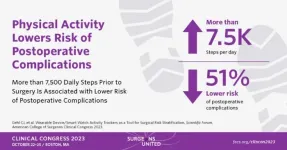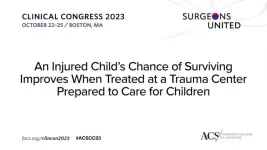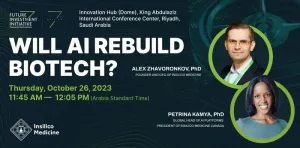(Press-News.org) Key Takeaways
A cancer survival calculator prototype developed with machine learning showed that for each of three cancer types tested, more factors than cancer stage significantly influenced patients’ survival.
Preliminary research on the calculator found high accuracy of this individualized survival estimator.
BOSTON (October 20, 2023): Researchers have developed an artificial intelligence (AI)–based tool for estimating a newly diagnosed cancer patient’s chances for surviving long term, according to a study presented at the American College of Surgeons (ACS) Clinical Congress 2023.
Currently, estimating survival rates for patients with cancer primarily depends on their cancer stage, said lead study author Lauren Janczewski, MD, a clinical scholar with ACS Cancer Programs and a general surgical resident at Northwestern University McGaw Medical Center, Chicago.
“There is a multitude of other factors that may influence a patient’s survival beyond just their staging criteria,” Dr. Janczewski said. “We sought to develop this Cancer Survival Calculator to provide a more personalized estimate of what patients can expect regarding their cancer prognosis.”
Using a type of AI known as machine learning, the multicenter research team created a prototype tool called the Cancer Survival Calculator and tested it on a nationwide cancer dataset. Initial tests estimated five-year survival for patients with cancers of the breast, thyroid, and pancreas.
Study details
According to Dr. Janczewski, this study aimed to identify the patient, tumor, and treatment characteristics that most greatly influence patient survival for each cancer type.
After cancer experts recommended characteristics to study, the researchers collected relevant information from patients diagnosed in 2015 and 2017 with breast, thyroid, and pancreatic cancers. The patients’ records were part of the National Cancer Database (NCDB), which contains records of 72 percent of newly diagnosed cancer cases in the United States.*
Three-fourths of the collected data were used to train the machine learning algorithms to recognize patterns between characteristics at diagnosis and patients’ survival at five years, and then to rank the factors with the greatest influence on survival. With the remaining data, the researchers used statistical methods to test the prototype’s accuracy in estimating survival.
Key findings
The team included data from 259,485 breast cancer patients, 76,624 thyroid cancer patients, and 84,514 pancreatic cancer patients. The researchers found multiple characteristics specific to patients, tumors, and treatments for all three cancer sites significantly influenced survival.
The top four factors influencing whether patients were alive five years after diagnosis were as follows, by cancer site:
Breast cancer: (1) whether the patient had cancer surgery, (2) the patient’s age at diagnosis, (3) tumor size, and (4) time from diagnosis to treatment.
Thyroid cancer: (1) age at diagnosis, (2) tumor size, (3) time to treatment, and (4) lymph node involvement.
Pancreatic cancer: (1) cancer surgery; (2) histology, or microscopic analysis of the cancer, (3) tumor size, and (4) age at diagnosis.
Also found to be important for survival from breast cancer were hormone receptor status, which is part of breast cancer staging, and the presence of Ki-67, a biomarker in breast cancer.
Although some of the predictive factors, such as tumor size, are part of cancer staging, Dr. Janczewski said their results showed that many more factors influence survival for cancer patients beyond their disease stage.
Furthermore, their validation testing showed that the calculator was “highly accurate” for all three cancer sites at estimating cancer survival rates – within nine to 10 months of actual survival, Dr. Janczewski reported.
Advantages of the new calculator
The Cancer Survival Calculator differs in several ways from cancer survival estimators already in use, according to Dr. Janczewski:
The novel calculator includes specific tumor biomarkers and treatment variables that are known to affect a patient’s estimated prognosis, which Dr. Janczewski said many prior survival calculators lack.
The dataset used to develop the new calculator, the NCDB, is more comprehensive than other calculators’ datasets, according to Dr. Janczewski.
The Cancer Survival Calculator uses new data modeling, such as machine learning, which speeds up processing. The models’ risk predictions also demonstrated improved accuracy compared with predictions generated by older calculators, she said.
Future steps
The next steps that Dr. Janczewski identified are to finalize a user interface that will allow the use of the Cancer Survival Calculator in clinical practice, followed by pilot testing the calculator at selected cancer centers.
Eventually, the researchers hope to broaden the calculator by adding all other cancer sites included in the NCDB. Initially, the calculator included breast, thyroid, and pancreatic cancers because these cancers have diverse patient populations and differing frequencies and average survival rates, she said.
The research team plans to make the finalized informational tool available to healthcare practitioners.
Study coauthors are Joseph Cotler, PhD; Bryan Palis, MA; Tanya Hoskin, MA; Courtney Day, MS; Ryan Merkow, MD, MS, FACS; Heidi Nelson, MD, FACS; Tracy Wang, MD, FACS; and Judy Boughey, MBBCh, FACS. Mayo Clinic and the Medical College of Wisconsin were study centers with Northwestern University.
The study authors have no disclosures.
Citation: Janczewski L, et al. Development of a National Cancer Survival Calculator Prototype Using Machine Learning, Scientific Forum, American College of Surgeons (ACS) Clinical Congress 2023.
___________________
*The NCDB is a joint program of the ACS Commission on Cancer and the American Cancer Society. The database collects more than 1.5 million new cancer cases each year.
# # #
About the American College of Surgeons
The American College of Surgeons is a scientific and educational organization of surgeons that was founded in 1913 to raise the standards of surgical practice and improve the quality of care for all surgical patients. The College is dedicated to the ethical and competent practice of surgery. Its achievements have significantly influenced the course of scientific surgery in America and have established it as an important advocate for all surgical patients. The College has approximately 90,000 members and is the largest organization of surgeons in the world. "FACS" designates that a surgeon is a Fellow of the American College of Surgeons.
END
A cancer survival calculator is being developed using artificial intelligence
The new machine learning tool can estimate a patient-specific prognosis for breast, thyroid, and pancreatic cancers
2023-10-20
ELSE PRESS RELEASES FROM THIS DATE:
Study links school redistricting to higher rates of firearm violence in urban communities
2023-10-20
Key takeaways
This is the first study to examine the impact of school redistricting on firearm violence in urban communities, examining data from 63,000 urban census tracts.
Any school redistricting event was associated with a 10.6% higher firearm incidence rate compared with communities that had no redistricting, and school boundary adjustments were associated with a 21.3% increase.
In areas that had a school redistricting event, firearm violence increased 14% in the year the redistricting occurred over the previous year.
BOSTON (October 20, ...
East Los Angeles program to remove tattoos may help reduce traumatic injuries
2023-10-20
Key Takeaways
Tattoos, especially those related to gangs and sex work, can make individuals targets for violence.
Tattoos may also make it more difficult for individuals to make changes in their lives, including finding a job or joining the military.
Nearly nine out of 10 of the program’s clients (88%) desired tattoo removal to transition to a healthier life, and more than eight of 10 clients (81%) reported success in achieving their goals after tattoo removal.
BOSTON (October 20, 2023): Tattoo removal may help to reduce violence and trauma in East Los Angeles, according to study results being presented at the American ...
More than 7,500 daily steps prior to surgery is associated with lower risk of postoperative complications
2023-10-20
Key takeaways
Using Fitbit activity tracking data, researchers identified patients who might be at higher risk of postoperative complications. Fewer daily steps were associated with a higher rate of complications postoperatively.
The odds of complications within 90 days after hospital discharge were reduced by half if a patient took more than 7,500 steps a day before the operation, after adjusting for the complexity of the procedure, comorbidities, and other factors.
CHICAGO (October 20, 2023): Patients who recorded more ...
Pediatric trauma more common during COVID-19 pandemic, especially for children in disadvantaged neighborhoods
2023-10-20
Key Takeaways
Childhood trauma rates increased during the COVID-19 pandemic and were disproportionately higher for children in socioeconomically deprived areas.
In this vulnerable population, injuries were most often due to motor vehicle crashes, firearms, and non-accidental trauma.
The study adds to growing evidence of pandemic-related effects on health and reinforces the need for efforts to prevent pediatric trauma.
BOSTON (October 20, 2023): Injuries from gunshots and motor vehicle ...
An injured child’s chance of surviving improves when treated at a trauma center prepared to care for children
2023-10-20
Key Takeaways
Trauma centers with the highest pediatric readiness scores (93 or greater) on a national assessment have much lower death rates than centers scoring lower.
All trauma centers should address gaps in pediatric emergency care — most importantly, the lack of having a pediatric-specific quality improvement plan.
BOSTON (October 20, 2023): Children initially treated at trauma centers with the highest level of preparedness to care for children, called pediatric readiness, are significantly less likely to die than those initially treated at trauma facilities with lower pediatric readiness levels, new research shows. The findings are being presented ...
Reliable patient education materials on breast cancer are difficult to access
2023-10-20
Key Takeaways
Women with breast cancer, who are making complex decisions about treatment options during an already stressful time, may turn to the wide variety of materials available online, which are not always from data-driven sources.
Researchers found that educational materials often vary in quality, can have a negative tone, and are written above the sixth-grade reading level recommended by the National Institutes of Health.
BOSTON (October 20, 2023): Women with breast cancer must often make complex decisions about surgery and treatment options ...
Team looking at gene therapy for children paralyzed by rare mutations
2023-10-20
SAN ANTONIO, Texas, USA (Oct. 20, 2023) — The 50 families stretch from the Netherlands and the United Kingdom to the United States and China. Each family has a child who is paralyzed from a mutation in a single gene named Contactin-Associated Protein 1 (Cntnap1).
The children are locked inside their bodies, unable to move. The families feed them and change them, and someone monitors them 24/7.
Thousands of miles away in South Texas, Manzoor Bhat, MS, PhD, and his team at The University of Texas Health Science Center at San Antonio are making ...
UCLA Health part of new study digging into the unknowns of bipolar disorder
2023-10-20
A new study is gathering extensive data about people with bipolar disorder to improve diagnosis and treatment of this mental health condition that affects 40 million people worldwide, according to the World Health Organization.
UCLA Health is among six inaugural sites of the BD2 Integrated Network, which aims to enroll 4,000 participants for the study. Researchers intend to collect health metrics, brain scans, self-reported symptoms and data on movement and sleep from wearable trackers, over time, in what’s known as a longitudinal cohort study.
The BD2 Integrated Network also forms a learning collective among the ...
Insilico Medicine presents at Future Investment Initiative Conference in Riyadh
2023-10-20
Executives from clinical stage artificial intelligence (AI)-driven drug discovery company Insilico Medicine will present on the impact of AI on biotechnology at the Future Investment Initiative (FII) Conference in Riyadh, Saudi Arabia.
Alex Zhavoronkov, PhD, founder and CEO of Insilico Medicine and Petrina Kamya, PhD, Head of AI Platforms and President of Insilico Medicine Canada will present on the topic “Will AI Rebuild Biotech?” on Oct. 26, 11:45am Arabic Standard Time. The event is available to be livestreamed.
The FII Conference brings together the world’s foremost CEOs, policymakers, ...
Study shows promise for iNKT cell platform to treat cancer
2023-10-20
Allogeneic invariant natural killer T cells (allo-iNKTs) from a healthy donor have been shown to have therapeutic effects in treatment-resistant cancers and improve survival from COVID-19-related acute respiratory failure in previous studies. Unlike T cells, allo-iNKTs can be transferred from one person to another without causing graft-versus-host disease. But allo-iNKT cells rapidly become undetectable in the body after infusion, raising concerns over their rejection and disease relapse. Their functioning also varies from person to person.
Researchers from the School of Veterinary Medicine and Perelman School of Medicine hypothesized ...
LAST 30 PRESS RELEASES:
Next-generation CAR-T designs that could transform cancer treatment
As health care goes digital, patients are being left behind
A clinicopathologic analysis of 740 endometrial polyps: risk of premalignant changes and malignancy
Gibson Oncology, NIH to begin Phase 2 trials of LMP744 for treatment of first-time recurrent glioblastoma
Researchers develop a high-efficiency photocatalyst using iron instead of rare metals
Study finds no evidence of persistent tick-borne infection in people who link chronic illness to ticks
New system tracks blockchain money laundering faster and more accurately
In vitro antibacterial activity of crude extracts from Tithonia diversifolia (asteraceae) and Solanum torvum (solanaceae) against selected shigella species
Qiliang (Andy) Ding, PhD, named recipient of the 2026 ACMG Foundation Rising Scholar Trainee Award
Heat-free gas sensing: LED-driven electronic nose technology enhances multi-gas detection
Women more likely to choose wine from female winemakers
E-waste chemicals are appearing in dolphins and porpoises
Researchers warn: opioids aren’t effective for many acute pain conditions
Largest image of its kind shows hidden chemistry at the heart of the Milky Way
JBNU researchers review advances in pyrochlore oxide-based dielectric energy storage technology
Novel cellular phenomenon reveals how immune cells extract nuclear DNA from dying cells
Printable enzyme ink powers next-generation wearable biosensors
6 in 10 US women projected to have at least one type of cardiovascular disease by 2050
People’s gut bacteria worse in areas with higher social deprivation
Unique analysis shows air-con heat relief significantly worsens climate change
Keto diet may restore exercise benefits in people with high blood sugar
Manchester researchers challenge misleading language around plastic waste solutions
Vessel traffic alters behavior, stress and population trends of marine megafauna
Your car’s tire sensors could be used to track you
Research confirms that ocean warming causes an annual decline in fish biomass of up to 19.8%
Local water supply crucial to success of hydrogen initiative in Europe
New blood test score detects hidden alcohol-related liver disease
High risk of readmission and death among heart failure patients
Code for Earth launches 2026 climate and weather data challenges
Three women named Britain’s Brightest Young Scientists, each winning ‘unrestricted’ £100,000 Blavatnik Awards prize
[Press-News.org] A cancer survival calculator is being developed using artificial intelligenceThe new machine learning tool can estimate a patient-specific prognosis for breast, thyroid, and pancreatic cancers







